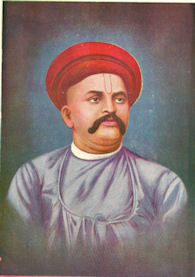

Mit den Auflösungen nach dem "Key" neu herausgegeben von Alois Payer
Zitierweise | cite as:
Apte, Vaman Shivaram <1858 - 1892>: The student's guide to Sanskrit Composition (Being a treatise on Sanskrit Syntax). -- 3. ed. -- 1890. -- 12. Lesson XII. -- Fassung vom 2010-03-11. -- URL: http://www.payer.de/apte/apte12.htm
Ursprünglich erschienen als:
Apte, Vaman Shivaram <1858 - 1892>: The student's guide to Sanskrit composition : being a treatise on Sanskrit syntax ; for the use of schools and colleges. -- 3rd ed. -- Poona : R. A. Sagoon, 1890. -- 450 S.
A Key to Apte's Guide to Sanskrit composition : giving a close rendering into English and Sanskrit of all the Sanskrit and English sentences / compiled by an experienced graduate teacher. -- 2d ed. -- Bombay : Standard Pub., 1923. -- 136 p. ; 18 cm
Erstmals hier publiziert: 2010-03-11
Überarbeitungen:
©opyright: Public domain
Dieser Text ist Teil der Abteilung Sanskrit von Tüpfli's Global Village Library
Falls Sie die diakritischen Zeichen nicht dargestellt bekommen, installieren Sie eine Schrift mit Diakritika wie z.B. Tahoma.
Die Devanāgarī-Zeichen sind in Unicode kodiert. Sie benötigen also eine Unicode-Devanāgarī-Schrift.
Use of brackets:
<> = Apte`s own Notes (loc. cit. pp. 277ff.)
[] = A Key to Apte's Guide to Sanskrit composition : giving a close rendering into English and Sanskrit of all the Sanskrit and English sentences / compiled by an experienced graduate teacher. -- 2d ed. -- Bombay : Standard Pub., 1923. -- 136 p. ; 18 cm
{} = Notes by Alois Payer
§ 126. The use of the personal pronouns is not peculiar. They are subject to the same rules as nouns, when under the government of verbs or prepositions; as, अहं त्वां प्रार्थये 'I pray to thee'; त्यया विना सो ऽपि समुत्सुको भवेत् (Vikramorvaśīya 1).
§ 127. 1 But the short forms of अस्मद् and त्वद्, i.e. मा, मे, नौ, नः, त्वा, ते, वां, and वः, deserve notice. They are never used at the beginning of a sentence and immediately before the particles च, वा, एव and हा (rarely अह or ह) and at the beginning of a foot of metre; as मे मित्रं, नः पाहि, वां मुख्यं &c. are wrong; तस्य च मम (not मे) च वैरमस्ति 'there is enmity betwixt him and me'; तस्य मम वा गृहम् (not मे वा); इदं पुस्तकं ममैव (not मे एव); हा मम मंदभाग्यं (not मे); वेदैरशेषैः संवेद्यो ऽस्मान् (not नः) कृष्णः सर्वदावतु (Siddhāntakaumudī) 'may Kṛṣṇa, fit to be known by all the Vedas, always protect us!'
1 न चवाहवैवयुक्ते । (Pāṇini VIII.1.24) {'The above substitutions do not take place when there is connection with the pronouns any of these: - च, 'and' वा, 'or' ह, 'oh!' अह, 'wonderful', or एव 'only'.' Transl. Vasu, 1891}
पदात् । अपादादौ । युष्मदस्मदोः षष्टीचतुर्थीद्वितीयास्थयोर्वानावौ । (Pāṇini VIII.1.17.18.20) {'17. Upto VIII.1.68 inclusive should always be supplied the phrase "after a pada". 18. Upto VIII.1.74 inclusive is to be supplied the phrase "The whole is unaccented, if it does not stand at the beginning of the foot of a verse". 20. For the Genitive, Dative and Accusative Dual of yuṣmad and asmad, are substituted वाम् and नौ respectively, when a word precedes, and these substitutes are anudātta.' Transl. Vasu, 1891}

Abb.: वेदैरशेषैः संवेद्यो
ऽस्मान्कृष्णः
सर्वदावतु ॥
Playful Gifts and other Gopi Scenes, pichwai from Golconda (గోల్కొండ),
India, late 17th century, dyed cotton with polychrome and gold.
[Source: Haa900 / Wikipedia. -- Public domain]
(a) When the particles do not connect these forms, the short form may be used with them; as, हरो हरिश्च मे स्वामी (Siddhāntakaumudī) 'Hara and Hari are my lords'; किं वा मे पुत्री करोतु 'what indees, will my daughter do?'

Abb.: हरो हरिश्च मे
स्वामी
[Source: Redtigerxy /
Wikipedia. -- Public domain]
(b) Similarly these short forms are not used immediately after Vocative forms; as; वयस्य मम (not मे) गृहमेतत्त्; देवास्मान् (not नः) पाहि सर्वदा (Siddhāntakaumudī) 'O God, always protect us.' The Vocative is in fact, an abridged sentence.
(c) If a qualifying adjective follows the Vocative forms, the short forms may be used; as, हरे दयालो नः पाहि (Siddhāntakaumudī) 'Oh, kind Hari, protect us.' {In fact the Nominative दयालो is not qualifying the Vocative. The sentence means: 'Hari, thou art kind, protect us,' or 'Hari, protect us as you are kind.'}
§ 128. भवत् is often used with reference to the person addresses, as a courteous form of expression, not necessarily implying respect; it is to be regarded as a pronoun of the third person, and the verb must agree with the third person; as, अथ वा कथं भवान्मन्यते (Mālavikāgnimitra 1) 'or how do you think?'; वयमपि भवत्यौ किमपि पृच्छामः 'I too, ask you something.'
§ 129. When respect is to be shown, भवत् (भवती f.) is preceded by अत्र and तत्र् or स1, the former referring to a person that is near, the latter to one who is at a distance, or absent, from the speaker; as, क्व तत्रभवती कामन्दकी 'where is the worshipful Kāmandakī?'; आदिष्टो ऽस्म तत्रभवता काश्यपेन (Śakuntalā 4) 'I am ordered by the worthy Kāśyapa'; अपेहि रे अत्रभवान्प्रकृतिमापन्नः (Śakuntalā 2) 'begone, this worthy person is himself again'; मां स भवान्नियुंक्ते (Mālatīmādhava 1) 'His honour appoints me.'
1 This is an inaccuracy. स is not prefixed to भवत् like अत्र or तत्र; we do not find such forms as सभवता &c. in use. In the instances cited it must be read separately.
§ 130. There are three demonstrative pronouns; इदम् or एतद् 'this', तद् 'that', and अदस् 'this,' or 'that'; they are used along with nouns they refer to, or are used without them; as, एष नृपः; स पुरुषः; तद् गृहं; स आहः; एष मे किंकरः; इदं नो गृहं, असौ विद्याधरः.
§ 131. The forms of इदम् and एतद् are sometimes used in the sense of 'here' in sentences like 'here I come', 'here comes the boy,' usually in conjunction with the 1st or 3rd persons, and agreeing with the subject of the sentence like an ordinary adjective; as, आर्यपुत्र इयमस्मि (Śakunatalā 1) 'lord, here I am;' इयमहमारोहामि (Uttararāmacarita 1) 'here I mount'; अयमागच्छामि (Śakuntalā 3) 'here I come'; so इयं सा जातिः परित्यक्ता (Veṇīsaṃhāra 3).
§ 132. तद् is often used in the sense of celebrated or well-known; as, सा रम्या नगरी (Vairāgyaśataka III.37) 'that celebrated charming city'; सामंतचक्रं च तत् (ibid.) 'an that well-known circle of tributary princes'.
Compare the use of ille {'that'} in Latin.
(a) तद् is often used in the sense of very, same, with एव generally expressed or implied from the context; as, तानीन्द्रियाणि सकलानि (Nītiśataka II.40) 'all the organs are the same'; तदेव नाम (ibid.) 'the name is the same;' एते त एव गिरयः (Uttararāmacarita 3) 'these are those very mountains'; तदेव पंचवटीवनं (Uttararāmacarita 3) 'the forest of Pañcavaṭī is the same.'
(b) When तद् is repeated, it has the sense of several, various; as, तेषु तेषु स्थानेषु (Kādambarī 369) 'in various places.'
§ 133. When the relative pronoun is repeated, it has the sense of totality, whatever, and the correlative pronoun is generally repeated; as, क्रियते यद्यदेषा कथयति (Uttararāmacarita 1) 'I shall do all that she says;' यो यः शस्त्रं बिभर्ति ... क्रोधान्धस्तस्य स्वयमिह जगतामन्तकस्यान्तको ऽहं (Veṇisamhāra 3) 'whoever bears a weapon, of him, even the destroyer of the worlds, I become the destroyer'; so, यं यं पश्यसि तस्य तस्य पुरतो मा ब्रूहि दीनं वचः (Nītiśataka 51) ['do not utter pitiable words before every one you happen to see.']
(a) Sometimes the idea of whatever, or any whatever, is expressed by joining the relative with the interrogative pronoun, with or without the particles अपि, चित् or चन; as, एतादृशी रूपवती कन्या यस्मै कस्मैचिन्न दातव्या 'a girl, so beautiful as this, should not be given to any person whatsoever'; यो वा को वा भवाम्यहं (Veṇīsaṃhāra 3) 'whoever I may be'; यत्र कुत्रापि स्वपिति 'he sleeps anywhere.'

Abb.:
एतादृशी
रूपवती कन्या यस्मै कस्मैचिन्न दातव्या
Photography by Raja Lala Deen Dayal
(1844 - 1905), about 1890
§ 134. Interrogative pronouns and their derivatives are used in asking questions; as, कः पुनरसौ जान्माता (Uttararāmacarita 1) 'but who is this son-in-law?'; कतमेन दिग्भागेन गतः स जाल्मः (Veṇīsaṃhāra 1) 'in what direction is the rogue gone?'; किं करोमि क्व गच्छामि (Uttararāmacarita 1) 'what shall I do? where shall I go?'
§ 135. चित्, चन, अपि, and sometimes स्विद्, are added to interrogative pronouns and adverbs to give them the sense of indefinite pronouns; as, कश्चिद्यक्षो वसतिं चक्रे (Meghadūta 1) 'a certain Yakṣa made his abode;' कदाचिद्-चन-अपि 'at some time'; कास्विदवगुण्ठनवती नारी (Śakuntalā 5) 'some veiled lady.'

Abb.: कास्विदवगुण्ठनवती नारी
जोधपुर, राजस्थान
[Source: Nomad Tales. --
http://www.flickr.com/photos/pnglife/3030540709/. -- Downloaded on
2010-03-08. --
Creative Commons License (attribution, share alike)]
(a) अपिऽ sometimes in the sense of "indescribable" (अनिर्वाच्य); as, को ऽपि हेतुः (Uttararāmacarita 6) 'some indescribable motive'; so, तत्तस्य किमपि द्रव्यं यो हि यस्य प्रियो जनः (Uttararāmacarita 2) ['whoever is a dear person to anyone, that is is indescribable treasure.']
(b) क्वचित् - क्वचित्, कदाचित् - कदाचित् are used in the sense of in some place - in another place (here - there) and at one time - a another time, (sometimes - sometimes, now - now); as, क्वचिद्वीणावाद्यं क्वचिदपि च हा हेति रुदितं (Vairāgyaśataka 12) 'in one place is the playing on the lute; in another the cry of 'alas' (here you hear the lute - there you hear the cries of 'alas')'; कदाचित्काननं जगाहे कदाचित्कमलवनेषु रेमे (Kādambarī 58) 'sometimes (now) he plunged into the forest, and sometimes (now) he sported in lotus-forests.'
(c) क्वचित् - क्वचित् has rarely a reference to time also; as, क्वचिद् घनानां पततां क्वचिच्च (Raghuvaṃśa XIII.19) 'now of cloud, now of birds.'
§ 137. More generally एक - अपर or अन्य is used in the sense of the one - the other with reference to the two objects that are before specified; as, एको ययौ चैत्ररथप्रदेशान्सौराज्यरम्यानपरो विदर्भान् (Raghuvaṃśa V.60) 'the one went to regions of Caitraratha, the other to the country of the Vidarbhas (which was) happy on account of a good king.'
§ 138. When एक - अपर or अन्य is used in the plural, it has the sense of some others; as, विधवानां पुनरुद्वाहः शास्त्रप्रतिषिद्ध इत्येके मन्यन्ते शास्त्रविहित इत्यपरे (or अन्ये) 'some think that widow-marriage is prohibited by the Śāstras, others that it is ordained by them.'
(a) In this sense केचित् sometimes takes the place of एके; as, मदुक्तं केचिदन्वमन्यन्त । अपरे पुनर्निनिन्दुः (Daśakumāracarita II.4) 'some approved of my speech, others however, censured (it).'
§ 139. स्व, स्वकीय, आत्मीय and नीज are used reflexively; as, स्व नाम कथय 'tell your own name'; निजं धैर्यमदर्शयत् 'he showed his (own) courage.'

Abb.: निजं धैर्यमदर्शयत्
Photography by Raja Lala Deen Dayal
(1844 - 1905), 1901
(a) स्वयं meaning of one's self is a reflexive adverb; as, सा स्वयमेव तत्र जगाम 'she herself went there.'
§ 140. The word more commonly used as a reflexive pronoun is आत्मन् (= self). It is always used in the masculine gender and singular number, though the noun to which it refers be in any gender or number; as, का स्त्री अनेन प्रार्थ्यमानमात्मानं विकत्थते (Vikramorvaśīya 2) 'what woman boasts of herself being sought after by him?;' आत्मानं बहु मन्यामहे वयं (Kumārasambhava VI.20) 'we think highly of ourselves'; so, गुप्तं ददृसुरात्मानं सर्वाः स्वप्नेषु वामनैः (Raghuvaṃśa X.60) ['they saw in dreams that they were all guarded by dwarfs.']
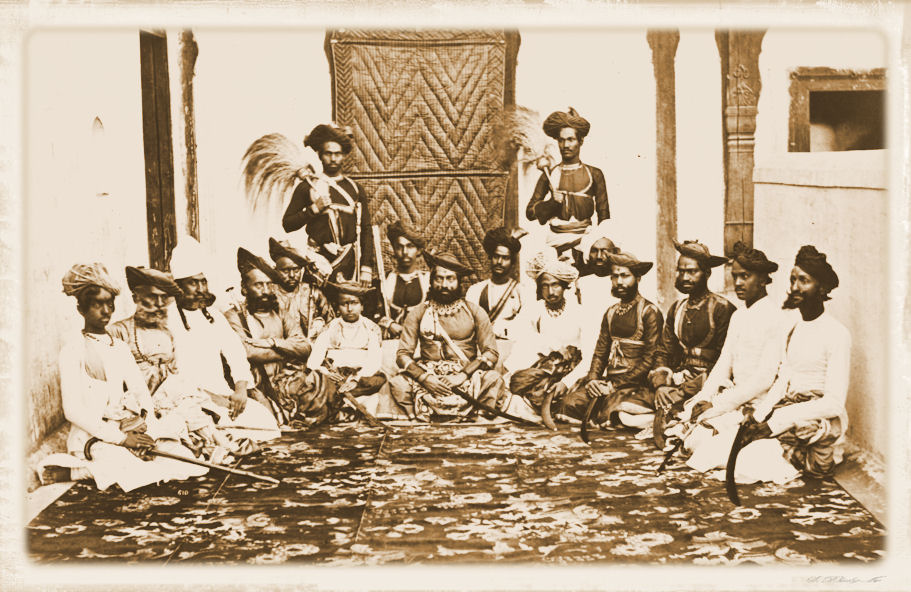
Abb.: आत्मानं बहु
मन्यामहे वयं
Photography by Raja Lala Deen Dayal
(1844 - 1905): Jayajirao Scindia, Maharaja of Gwalior, 1882
तस्य च मम च पौरधूर्तैर्वैरमुदपाद्यत ॥१॥ (Daśakumāracarita II.2)
[Key: पौरेषु धूर्ताः पौरधूर्तास्तैः
Enmity was produced between him and me by those cunning among the citizens.]
न नः कुतूहलमस्ति सर्पदर्शने ॥२॥ (Mudrārākṣasa 2)
[Key: We have no curiosity to see serpents.]

Abb.: न नः कुतूहलमस्ति
सर्पदर्शने
पुष्कर,
राजस्थान
[Source:
ZEDZAP-Nick. --
http://www.flickr.com/photos/zedzap/3310081234/. -- Downloaded on
2010-03-09. --
Creative
Commons License (attribution, no commercial use, share alike)]
श्रिशस्त्वावतु मापीह दत्तात्ते मे
ऽपि शर्मः सः ।
स्वामी ते मे ऽपि स हरिः पातु वामपि नौ विभुः ॥
सुखं वां नौ ददात्वीशः पतिर्वामपि नौ हरिः ।
सो ऽव्याद्वो नः शिवं वो नो दद्यात्सेव्यो ऽत्र वः स नः ॥३॥ (Siddhāntakaumudī)
<Notes: These four lines give the use of all the short forms. वः - नः in the sense of the instrumental; 'fit to be served by you or us.'>
[Key: May the lord of Śrī (Viṣṇu) protect thee and me in this world; he is the giver of (or, is to give) happiness to thee and to me; he is the lord of thee and me; may the all-pervading (or powerful) one protect you two and us two; Hari is the lord of you two and us two; may he protect you and us and grant you and us well-being; he deserves homage of you and of us.]
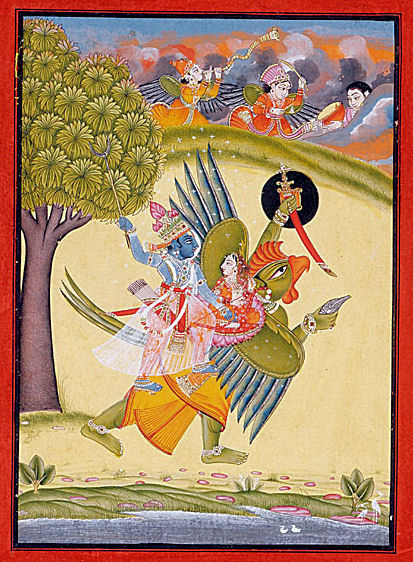
Abb.: श्रिशस्त्वावतु मापीह दत्तात्ते मे
ऽपि शर्मः सः ।
स्वामी ते मे ऽपि स हरिः पातु वामपि नौ विभुः ॥
सुखं वां नौ ददात्वीशः पतिर्वामपि नौ हरिः ।
सो ऽव्याद्वो नः शिवं वो नो दद्यात्सेव्यो ऽत्र वः स नः ॥
[Source:
Redtigerxyz /
Wikipedia. -- Public domain]
एवमत्रभवन्तो विदां कुर्वन्तु । अस्ति तत्रभवान्कश्यपः श्रीकण्ठपदलाञ्छनो भवभूतिर्नाम जातुकर्णीपुत्रः ॥४॥ (Uttararāmacarita 1)
[Key: May Your Honours know this; there is the revered (poet) Bhavabhūti by name, of the race of Kaśyapa, the son of Jātukarṇī and distinguished by the title, Śrīkaṇṭha.]
एषो ऽस्मि कार्यवशादायोध्यिकस्रदानींतनश्च संवृत्तः ॥५॥ (Uttararāmacarita 1)
<Notes: कार्यवशात् 'for my purpose', that I might understand and realize the events of that time.>
[Key: Here am I turned, and my business requires me, into an inhabitant of Ayodhyā and a contemporary of that time.]
तदेव पंचवटीवनम् । सैव प्रियसखी वसन्ती । त एव जातनिर्विशेषाः पादपाः । मम पुनर्मन्दभाग्यायाः सर्वमेवैतद्दृश्यमानमपि नास्ति ॥६॥ (Uttararāmacarita 3)
<Notes: Said by Sītā. जातनिर्विशेषाः 'just like my children.'>
[Key: जातेभ्यः निर्गतः विशेषो येषाम् । पादैः पिबन्तीति पादपाः । मन्दं भाग्यं यस्याः ।This is the same forest of Pañcavaṭī; my dear friend Vasantī is the same; the same are the trees that were regarded as not different from children (i.e. reared up like children.) To me again, an unlucky creature, all this, though being seen, does not exist.]
आयुष्मन्नेस वाग्विषयीभूतः स वीरः ॥७॥ (Uttararāmacarita 5)
<Notes: वाविषयीभूतेषु 'who formed the subject of our talk.'>
[Key: Long-living one, here is the warrior who formed the subject of our talk or here has the warrior come within speakable distance.]
राजा - आर्य बहु प्राष्टव्यमत्र । चाणक्यः - वृषल विश्रब्धं ब्रूहि । ममापि बह्वाख्येयमत्र । राजा - एष पृच्छामि । चाणक्यः - अहमप्येष कथयामि ॥८॥ (Mudrārākṣasa 3)
[Key: King - Revered sir, much is to be asked in this matter. Cāṇakya - Vṛṣala, ask freely (lit. without hesitation or misgiving). I, too, have much to tell you in connection with this matter. King - Here I ask. Cāṇakya - I, too, am ready to explain.]
अमुना व्यतिकरेण कृतापराधमिव त्वय्यात्मानमवगच्छति कादम्बरी ॥९॥ (Kādambarī 203)
[Key: On account of this incident (व्यतिकर) Kādambarī considers herself as guilty towards you.]
केचित्संपद्भिः प्रलोभ्यमाना रागावेशेन बाध्यमाना विह्वलतामुपयान्ति । अपरे तु धूर्तैः प्रतार्थमाणाः सर्वजनस्योपहास्यतामुपयान्ति ॥१०॥ (Kādambarī 106-8)
[Key: Some, powerfully allured by wealth and affected by the vehemence of passion, suffer affliction or distress. Others, who are deceived by rogues, become the laughing stock of all men (or are exposed to public ridicule).]
साहसकरिन्यस्ताः कुमार्यो याः स्वयं संदिशन्ति समुपसर्पन्ति वा ॥११॥ (Kādambarī 237)
<Notes: संदिशन्ति 'send love-messages.' समुपसर्पन्ति 'draw near their beloved ones.'>
[Key: Rash (or adventurous) are those girls who themselves (or of their own accord) send messages to or approach (their lovers).]
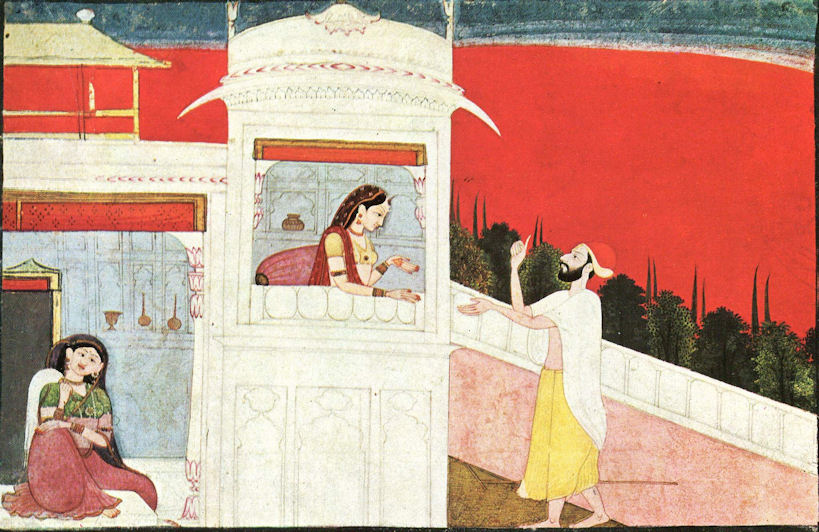
Abb.: साहसकरिन्यस्ताः
कुमार्यो याः स्वयं संदिशन्ति समुपसर्पन्ति वा
Guler painting, about 1655
अनयत्प्रभुशक्तिसंपदा वशमेको नृपतीननन्तरान् ।
अपरः प्रणिधानयोग्यया मरुतः पंच शरीरगोचरान् ॥१२॥ (Raghuvaṃśa VIII.19)
<Notes: एकः - अपरः Aja and Raghu. प्रभुशक्तिसंपदा 'by the excellence of his sovereign power,' प्रभुशक्ति consisting of कोष, दण्ड, and बल. प्रणिधानयोग्यया 'by the practice of concentration (meditation)'. शरीरगोचरान् 'visible in (i.e. pervading) the body.'>
[Key: The one (Aja) brought under his power (subdued) the neighbouring princes by the excellence of his regal power; the other (Raghu), by the practice of contemplation, brought under control the five vital airs in the body.]
{पञ्च मरुतः = प्राण, अपान, उदान, समान, व्यान}
कामैस्तैस्तैर्हृतज्ञानाः प्रपद्यन्ते
ऽन्यदेवताः ।
तं तं नियममास्थाय प्रकृत्या नियताः स्वया ॥१३॥ (Bhagavadgītā VII.20)
<Notes: Kṛṣṇa says to Arjuna: 'Those who are deprived of their discerning power by various desires, look up to other Gods, performing various rites and controlled (guided) by their own nature.>
[Key: See notes for translation. प्रकृत्या &c. - Explains how the natural tendency of their minds lead them to seek the help of such as Gaṇapati &c.]
अयमसौ मम ज्यायानार्यः कुशो नाम भरताश्रमात्प्रतिनिवृत्तः ॥१॥ (Uttararāmacarita 6)
[Key: This that elder brother of mine, Kuśa by name, who has now returned from the hermitage of Bharata.]
लक्ष्म्योन्मादिता व्यसनशतशरव्यतामुपगता वल्मीकतृणाग्रावस्थिता जलबन्धव इव पतितमप्यात्मानं नावगच्छन्ति ॥२॥ (Kādambarī 107)
<Notes: these lines describe the state of those who are puffed up with the possession of riches. व्यसनशत &c. 'though become the mark of hundreds of calamities', though exposed to hundreds of miseries, they do not perceive that their fall is imminent like that of the drops of water on the ends of grass growing on ant-hills.>
[Key: व्यसनानां शतानि व्शसनशतानि तेषां शरव्यताम् । वल्मीके तृणं वल्मीकतृणं तस्य अग्राणि तेषु अवस्थिताः ।
Stupefied by (the intoxication of) wealth and becoming the targets or marks of hundreds of vices or calamities, they do not even know that they are fallen, like drops of water lying on the points of grass growing on an anthill.]
तस्य तरुषंदस्य मध्ये मणिदर्पणमिव त्रैलोक्यलक्ष्म्याः क्वचित् त्र्यंबकवृषभविषाणकोटिखण्डिततटशिलाखण्डं क्वचिदैरावतदशनमुसलखाण्डितकुमुददण्डमच्छोदं बाम सरो दृष्टवान् ॥३॥ (Kādambarī 123)
<Notes: मणिदर्पनमिव etc. On account of its lucid and transparent water, it served, as it were, as a mirror for the Goddess of Splendour to see her face in.>
[Key: तरूणां षण्डः तस्य । मणीनां दर्पणम् । त्रीन्यम्बकान्यस्य त्र्यम्बकस्तस्य वृषभस्तस्य विषाणे तयोः कोटी त्र्यंबकवृषभविषाणकोटी ; शिलानां खण्डानि शिलाखण्डानि, तटे शिलाखण्डानि तटशिलाखण्डानि, त्र्यम्बकवृषभविषाणकिटिभ्यां खण्डितानि तटशिलाखण्डान । दशनौ मुसले इव दशनमुसले ; ताभ्यां खण्डिताः कुमुदानां दण्डा यस्मिन् ।
In the midst of that (vast) cluster of trees he saw a lake Acchoda by name, which was, as it were, the jewel-mirror of the goddess of beauty of the three worlds, in a part of which the pieces of rocks on the bank were broken by the points of the horns of Śiva's bull, and in another the lotus stalks in which were crushed by the pestle-like tusks of Airāvata.]
इति
नरपतिरस्त्रं यद्यदाविश्चकार
क्रमिवदथ मुरारिः प्रत्यहस्तत्तदाशु ॥४॥ (Śiśupālavadha XX.76)
<Notes: नरपतिः the Cedi king. आविश्चकार 'put forth,' 'exhibited.'>
[Key: Whatever missile the king thus put forth (lit. manifested) the enemy of Mura (Kṛṣṇa), who knew the order (of employing the proper missile against another), rendered nugatory (or repelled) quickly.]
{"MURA, MURU. A great demon who had seven thousand sons. He was an ally of the demon Naraka, who ruled over Pragjyotisha, and assisted him in the defence of that city against Krishna. He placed in the environs of that city "nooses the edges of which were sharp as razors," but Krishna cut them to pieces with is discus, slew Muru, "and burnt his seven thousand sons like moths with the flame of the edge of his discus." [Dowson, John <1820-1881>: A classical dictionary of Hindu mythology and religion, geography, history, and literature. -- London, Trübner, 1879. -- s.v. ]}
तानीन्द्रियाणि सकलानि तदेव नाम
सा बुद्धिरप्रतिहता वचनं तदेव ।
अर्थोष्मणा विरहितः पुरुषः स एव
त्वन्यः क्षणेन भवतीति विचित्रमेतत् ॥५॥ (Nītiśataka 40)
<Notes: अर्थोष्मणा विरहितः 'devoid of the warmth of wealth;' cf. the English phrase 'a warm man.'>
[Key: कलाभिः सहितानि सकलानि । अर्थस्योष्मा अर्थोष्मा तेन ।
His limbs, in their entirety, are the same (i.e. without being named); his name is the same; his unimpaired or unobstructed intellect is the same, his words the same; and yet the same man, deprived of the warmth of wealth, becomes quite a different person; this is very strange.]
एते त
एव गिरयो विरुवन्मयूरास्
तान्येव मत्तहरिणानि वनस्थलानि ।
आमञ्जुमञ्जुललतानि च तान्यमूनि
नीरन्भ्रनीलनिचुलानि सरित्तटानि ॥६॥ (Uttararāmacarita 2)
[Key: निरुवन्तो मयूरा येषु । मत्ता हरिणा येषु तानि । आमञ्जवो मञ्जुललता येषु तानि । यद्वा आमञ्जवो मञ्जुलाः पक्षिविशेषा यासु तादृशा लता येषु तानि । निर्गतानि रन्ध्राणि येभ्यस्ते नीरन्ध्राश्च ते नीलाश्च नुचुला येषु तानि । सरितां तटानि ।
These are the same mountains with peacocks uttering notes thereon; these are the forest sites with impassioned deer; and these are the banks of rivers with lovely Mañjula creepers (or, with creepers having sweetly warbling gallinules in them) and having thickly growing dark Nicula trees.]
{मञ्जुलः = मञ्जुलदात्यूहः = Porphyrio porphyrio L. = Purple moorhen (swamphen)

Abb.: मञ्जुलः =
मञ्जुलदात्यूहः = Porphyrio porphyrio L. = Purple moorhen (swamphen)
near Hodal, Haryana = हरियाणा = ਹਰਿਆਣਾ
[Source:
J.M.Garg / Wikipedia. -- GNU FDLicense]
निचुल m. = Barringtonia acutangula (L.) Gaertn.

Abb.: निचुलः =
Barringtonia acutangula (L.) Gaertn.
Hyderabad -
హైదరాబాద్ -
حیدرآباد
[Source: J.M.Garg / Wikipedia. -- GNU FDLicense]
यो
ऽत्ति
यस्य यदा मांसमुभयोः पश्यतान्तरम् ।
एकस्य क्षणिको प्रीतिरन्यः प्राणैर्विमुच्यते ॥७॥ (Hitopadeśa 1)
[Key: When one eats the flesh of another mark the difference between the two: one derives a momentary pleasure while the other loses his life.]

Abb.: यो
ऽत्ति
यस्य यदा मांसमुभयोः पश्यतान्तरम् ।
एकस्य क्षणिको प्रीतिरन्यः प्राणैर्विमुच्यते ॥
अजमांसम्, Delhi - दिल्ली
[Source: Saad.Akhtar.
--
http://www.flickr.com/photos/saad/96368947/. -- Downloaded on 2010-03-10. --
Creative
Commons License (attribution, no commercial use, no derivatives)]
वज्रं
च राजतेजश्च द्वयमेवातिभीषणम् ।
एकमेकत्र पतति पपत्यन्यत्समंततः ॥८॥ (Hitopadeśa 1)
[Key: The thunderbolt and sovereign power are both very terrible: the one falls in one place while the other falls all round (covers all place).]
विश्वम्भरात्मजा देवी राज्ञा त्यक्ता महावने ।
प्राप्तप्रसवमात्मानं गंगादेव्यां विमुञ्चति ॥९॥ (Uttararāmacarita 7)
[Key: विश्वं बिभर्तीति विश्वम्भरा तस्या आत्मजा । महच्च तद्वनं च तस्मिन् । प्राप्तः प्रसवो यस्य ।
The queen, (or, the divine) daughter of Earth, abandoned in the forest by the king, is throwing herself into the divine Ganges, the time of her delivery having arrived.]
काप्यभिख्या तयोरासीद्व्रजतोः शुद्धवेषयोः ।
हिमनिर्मुक्तयोर्योगे चित्राचन्द्रमसोरिव ॥१०॥ (Raghuvaṃśa I.46)
<Notes: 'As is seen in Citrā and the moon in their conjunction, when freed from mists.>
[Key: शुद्धो वेषो ययोस्तौ शुद्धवेशौ तयोः । हिमात् निर्मुक्तौ तयोः ।
As the two, dressed in clean or bright garments, passed on, a certain indescribable beauty was visible in their union, as there is in that of Citrā and the moon, of bright appearance (वेष) when freed from the mists of winter, as they journey through the sky.]
{चित्रा नक्षत्रं = Spica (α Virginis / Alpha Virginis; the brightest star in the constellation Virgo/Virgin)

Abb.: How to locate Spica / चित्रा
[Source: Jomegat / Wikipedia. -- GNU FDLicense]

Abb.:
चित्राचन्द्रमसोः संयोगः
[Source: Brenda Anderson. --
http://www.flickr.com/photos/curiouskiwi/41079913/. -- Downloaded on
2010-03-11. --
Creative
Commons License (attribution, no commercial use, share alike)]
को
ऽप्येष
एव पिशुनोग्रमनुष्यधर्मः
कर्णे परं स्पृशति हन्ति परं समूलम् ॥११॥
(Pañcatantra I.11)
<Notes: The peculiarity of slander is that he poisons the ears of one and destroys another (by reason of his backbiting), unlike the ordinary course of bites, which kill only him who is bitten.>
[Key: विशुनश्चासौ उग्रश्च विशुनोग्रः विशुनोग्रश्चासौ मनुष्यश्च तस्य धर्मः ।
This is the strange peculiarity of a wicked and terrible man, for he touches (whispers something into) the ear of one and destroys another, root and branch.]
रूपं
तदोशस्वि तदेव वीर्यं तदेव नैसर्गिकमुन्नतत्वम् ।
न कारणात्स्वाद्विभिदे कुमारः प्रवर्तितो दीप इव प्रदीपात् ॥१२॥ (Raghuvaṃśa V.37)
<Notes: these lines describe the qualities of Aja. 'The Prince did not differ from his (generating) cause, his father, just as a lamp lighted from another, does not differ from it' (in flame or light).>
[Key: His resplendent form was the same; just the same his (innate) strength and his natural tallness: the &c. see notes.]
{"AJA. 'Unborn.' An epithet applied to many of the gods.
A prince of the Solar race, sometimes said to be the son of Raghu, at others the son of Dilipa, son of Raghu.
He was the husband chosen at her swayamvara by Indumati, daughter of the Raja of Vidarbha, and was the father of Dasaratha and grandfather of Rama.
The Raghuvansa relates how on his way to the swayamvara he was annoyed by a wild elephant and ordered it to be shot. When the elephant was mortally wounded, a beautiful figure issued from it, which declared itself a gandharva who had been transformed into a mad elephant for deriding a holy man. The gandharva was delivered, as it had been foretold to him, by Aja, and he gave the prince some arrows, which enabled him to excel in the contest at the swayamvara.
When Dasaratha grew up, Aja ascended to Indra's heaven." [Dowson, John <1820-1881>: A classical dictionary of Hindu mythology and religion, geography, history, and literature. -- London, Trübner, 1879. -- s.v. ]}
All translations from the Key.
1. The worshipful Gautama has ordered me to do this work.
भगवान्गौतमः &c. ॥१॥
2. What does your reverence intend to speak on this auspicious occasion?
अस्मिन्मङ्गलसमये अत्रभवान्किं वक्तुमनाः or वक्तुमिच्छति ॥२॥
3. Dear Gopāla, do not weep; here come thy two brothers whom thou regardedst as dead.
भद्र गोपाल मा रुदिहि । इमावागच्छतस्तव भ्रातरौ यौ त्वं मृतौ मन्यसे ॥३॥
4. Here comes the mother of this child with fruits in her hand.
इयमागच्छति &c. ॥४॥
5. There is some indescribable pleasure in the company of the wise.
धीमतां समागमे को ऽप्यानन्दो वर्ततते ॥५॥
6. They saved themselves with great difficulty at that perilous time.
ते तस्मिञ्जीवितसंशयकाले (भयहेतुके काले) कथमप्यास्मानमरक्षन् ॥६॥
7. These two boys were brought up by me just like my own children; the one was very clever, but the other extremely dull.
एतौ बालौ मया स्वपुत्रनिर्विशेषं वर्धितौ or पोषितौ । तयोरेको ऽतीव पटुरन्यो ऽत्यन्तं मन्दमतिः ॥७॥
8. She thought herself most unfortunate at hearing that news.
तां वार्तां श्रुत्वा सात्मानमत्यन्तं मन्दभाग्यं दैवोपहतं or अधन्यममन्यत ॥८॥
9. There goes a report that in the temple of Bhadrakālī lives an old woman. At one time she begins to rave, at another to speak sensibly.
अस्त्येषा किंवदन्ती or अयं लोकवा्दो or जनप्रवादो यद्भद्रकाल्या आयतने कापि स्थविरा or जरसी वसति । सा कदाचिदसंबद्धं or उन्मत्तवत् प्रलपितुमारभते कदाचित्सयुक्तिकं भाषते च or सा एकदा ... अन्यदा &c. ॥९॥
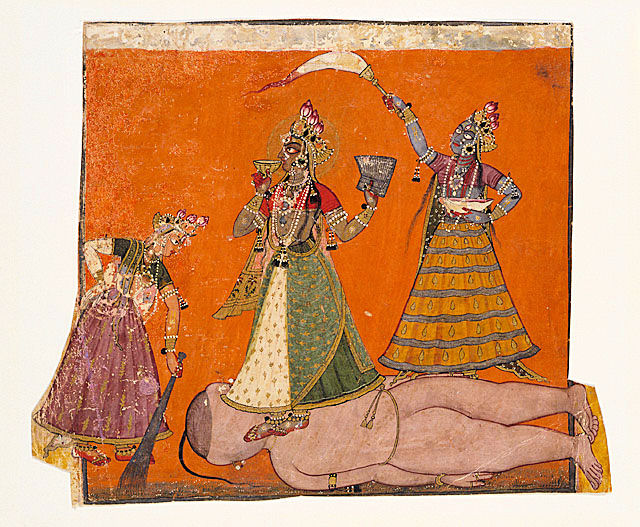
Abb.: भद्रकाली
Basholi painting, Himachal Pradesh -
हिमाचल
प्रदेश, ca. 1675
[Source:
Redtigerxyz
/ Wikipedia. -- Public domain]
10. Some philosophers believe that God created the whole Universe; others hold that it sprang up of itself.
ईश्वरेणाखिलमिदं विश्वं सृष्टमित्येके तत्त्वविदः । अपरे तु तत्स्वयंभ्विति or स्वयमेवोत्पन्नमिति मन्यन्ते ॥१०॥
11. Some men accomplish their own good, some the good of the people alone, while others try to accomplish both.
केचिदात्मनो हितं साध्नुवन्त्यन्ये परेषामेव केवलम् । अपरे तूभयमेव सम्पादयन्ति ॥११॥
12. The sons of Yajñadatta have become proficient in various arts and sciences.
यज्ञदत्तपुत्रास्तासु तासु कलासु तेषु तेषु शास्त्रेषु च निपुणाअभन् or प्रवीण्यं लेभिरे ॥१२॥
13. It is the very man I saw on the road dressed in tattered rags.
अयमेवासौ नरो यं चीरवाससं or कार्पटिकं रथ्यायामपश्यम् ॥१३॥
14. He studies anywhere, goes out with anybody, dines in anybody's house, and sleeps anywhere.
स क्वाप्यधीते येन केनापि सह बहिर्याति यस्य कस्यापि गृहे भुंक्ते यत्र कुत्रापि स्वपिति च ॥१४॥

Abb.: यत्र कुत्रापि
स्वपिति
[Source: kaibara87. --
http://www.flickr.com/photos/kaibara/4068996309/. -- Downloaded on
2010-03-11. --
Creative Commons License (attribution)]
15. Whoever is strong-minded, will try to take revenge for any insults given to him.
यः को ऽपि स्थिरधीः or मन्स्वी भवेत् सः परकृतावज्ञायाः - परकृतनिकृतेः or परिभवस्य प्रतिकारं कर्तुं यतेत ॥१५॥
16. Speak sweetly with all those persons that may come to your house.
ये केचन गृहमपेयुस्ते प्रियभाषेण or मधुरया गिरा सत्कर्तव्याः or सम्भावयितव्याः or तैः सह मधुरभाषणं कर्तव्यम् &c. or तान्मधुरमालप ॥१६॥
To Lesson XIII.